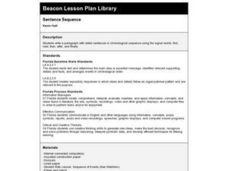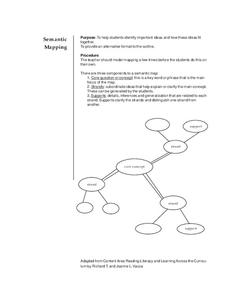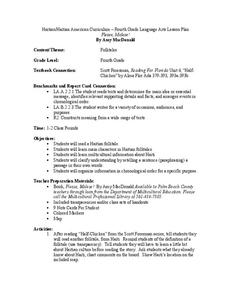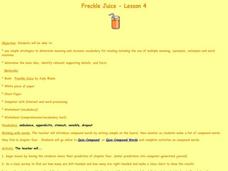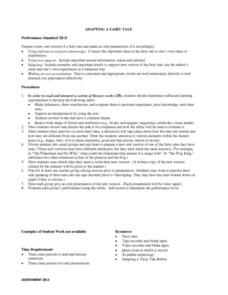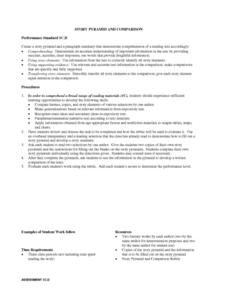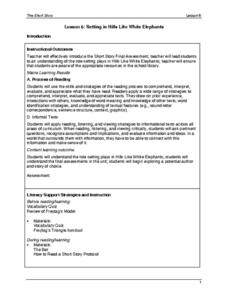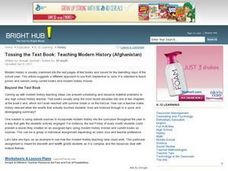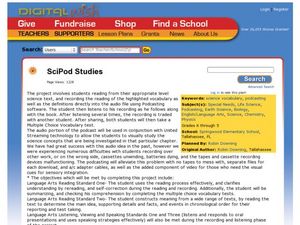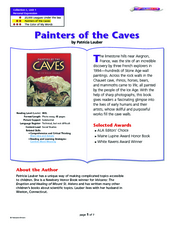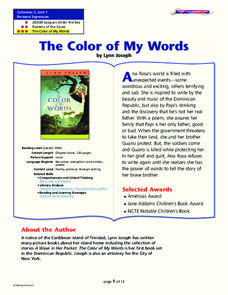Curated OER
Our Special Keepsake
Third graders observe the procedure for writing a single paragraph. They listen to a story and write a single paragraph response including a topic sentence, with supporting sentences.
Curated OER
Sentence Sequence
Second graders write a paragraph with detail sentences in chronological sequence.
Curated OER
In the News
Third graders participate in a lesson plan that helps to improve reading comprehension. They move through several activities that help them understand how to express their opinions, support their statements and communicate these...
Curated OER
Semantic Mapping
Students explore semantic mapping. Through teacher modeling and independent practice they complete a variety of semantic (concept) maps to coincide with specific areas of subject matter. They identify the core concept and include...
Curated OER
Folktales
Fourth graders read a Haitian folktale. They study main characters in Haitian folktales and explore multicultural information about Haiti. They clarify understanding by retelling a sentence (paraphrasing) and a passage in their own...
Curated OER
Friendly Patter Poetry
Students create a free from poem on the topic of friendship. They read examples of free form poetry to gather ideas. Through the use of a graphic organizer, students generate a list of friendship characteristics which is used to create...
Curated OER
Monster Lesson
Fifth graders write a detailed description of a monster or alien they have created. They e-mail the description to another student, and the e-mail buddy draws the monster based on the descriptive writing.
Curated OER
Freckle Juice
Students analyze a chapter from the assigned book they are reading. In this reading comprehension lesson plan, students read chapter four from Freckle Juice by Judy Blume, and discuss the main character, Andrew. Students...
Curated OER
The Underground Railroad in the I and M Canal Area
Students discuss provocative statements about the Underground Railroad and form opinions. They locate and read a selection on the Internet that either supports of discredits their written opinions. They then read a speech by John Hossack.
Orange County Department of Education
Integrity and a Boy Called Slow
Fifth graders identify the character trait of integrity in the main character, Slow, in "A Boy Called Slow." They participate in a discussion to determine what steps the main character took to earn his new name. Students write an essay...
Curated OER
Adapting a Fairy Tale
Students read and prepare a new oral version of a selected fairy tale. They read and compare/contrast two fairy tales and identify the main story elements. In small groups they create a new oral version of one they fairy tales and...
Curated OER
Teaching a Short Story
Students work in small groups and prepare an analysis of a short story to be presented to their peers. They research the story and create a handout or a visual aid that cites sources of information and summarizes the main points of the...
Curated OER
Too Many Tamales
Students investigate Mexican holiday celebrations and compare them to American Christmas holidays. They conduct a Mexican Christmas Scavenger Hunt. The activity uses a streaming video in order to engage students in the main objectives.
Curated OER
Story Pyramid And Comparison
Students investigate the details of a chosen story of literature. They use a pyramid graphic organizer to record information. The information is used to write a summary of the story. Students use a rubric while writing the summary to...
Channel Islands Film
Lone Woman of San Nicolas Island: Lesson Plan 3
Should researchers be able to excavate, examine, and remove Native American artifacts from historic sites? Should companies be permitted to build on sacred Native American land? After watching West of the West's documentary, The Lone...
Maine Content Literacy Project
Setting in "Hills Like White Elephants"
Continue your study of the short story with the next lesson in this fourteen-lesson series. After wrapping up a study of "Hills Like White Elephants" through a quiz and discussion of the setting, learners are introduced to the final...
Curated OER
Tossing the Text Book: Teaching Modern History
Tenth graders analyze primary sources. In this Current Events lesson, 10th graders write a short two - three paged paper answering a specific question. Students prepare a fact sheet for the class detailing points that support...
Curated OER
SciPod Studies
Have fun preparing a science podcast. After reviewing vocabulary, learners record audio files to create science vocabulary podcasts for particular units of study. A clever way to incorporate technology.
Curated OER
Mobile of Information
Learners create a mobile of various geometric designs to be usend to display information from a variety of texts. They add graphics as well as graphs and charts, color, design and artwork to express the ideas learned through the...
Curated OER
Choosing Where to Act
Students work together to reach a consensus about an issue. They examine a list of organizations and determine which ones meet a given set of criteria. They write supporting sentences for main ideas to end the lesson plan.
Curated OER
Painter of the Caves
What a great lesson! Learners read a story called Painters of the Caves by Patricia Lauber which discusses Stone Age wall paintings in Avignon, France. There is a series of discussion questions, comprehension questions, and a graphic...
Curated OER
The Color of My Words
Explore the story The Color of My Words by Lynn Joseph using this resource. Learners answer comprehension questions, fill in graphic organizers, and write a poem.
Curated OER
Lesson Refresh: Plan with the END in Mind
Fourth graders identify literary techniques by participating in a class discussion. In this organization lesson, 4th graders practice public speaking while presenting ideas for a story to their classmates as well as critiquing the ideas...
Curated OER
Defending Political Positions
Students read an article on a major issue and identify the position of the author. Individually, they use the article to support the author's position and critique it. They develop their own argument in support or against the author...



